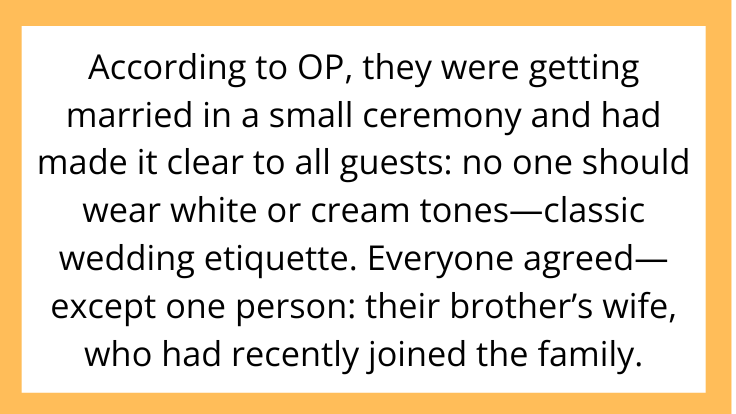AITAH for Not Letting My Brother’s New Wife Wear White to My Wedding?
Weddings are supposed to be joyful, once-in-a-lifetime celebrations—but they can quickly become battlegrounds when traditions, expectations, and egos collide. One post on r/AITAH recently sparked major debate after the original poster (OP) asked if they were wrong for telling their brother’s new wife that she couldn’t wear white to their wedding.
The post brought up questions about boundaries, etiquette, and whether asserting your wishes automatically makes you controlling. In this blog post, we’ll break down the drama, look at the perspectives involved, and talk about why wedding boundaries are important—and often misunderstood.
The Story: When a Dress Becomes a Statement

According to OP, they were getting married in a small ceremony and had made it clear to all guests: no one should wear white or cream tones—classic wedding etiquette. Everyone agreed—except one person: their brother’s wife, who had recently joined the family.
Despite being told several times (politely and then more firmly), the sister-in-law insisted she would wear a white designer gown because “it’s her favorite dress,” and she doesn’t believe in “outdated rules.” OP then made the tough call: either she wears something else, or she doesn’t attend.
That didn’t go down well. The brother accused OP of being dramatic and excluding his wife. Some family members took his side, calling OP controlling and insecure.
So… AITAH?
Why Wearing White to a Wedding Is (Still) a Big Deal

Wedding etiquette may evolve, but some customs remain deeply symbolic. Wearing white to a wedding—unless you’re the bride—is widely seen as a disrespectful move. Here’s why it still matters:
-
Symbolism: White is traditionally reserved for the bride. It’s a visual cue of who the celebration is centered around.
-
Spotlight stealing: Wearing a white gown can distract attention and create unnecessary drama.
-
Basic respect: When a couple makes a clear, reasonable request, honoring it shows you care.
Whether someone personally agrees with the rule or not doesn’t change its meaning in broader culture.
Boundaries vs. Control: Knowing the Difference

Some people reading OP’s story felt that she was being too rigid, and that a dress shouldn’t cause so much friction. But there’s a clear difference between being controlling and setting boundaries.
-
Boundaries are about self-respect: “Please don’t wear white to my wedding” is about preserving the integrity of your big day.
-
Control is about dominance: Telling someone what to wear daily, or outside your event, would cross into control.
-
Boundaries invite cooperation: When you set a limit and explain why, you’re offering people a chance to respect you.
In this situation, OP wasn’t telling her sister-in-law how to live—just asking for one rule to be honored for a few hours.
The Role of Family Pressure

As is often the case in AITAH posts, extended family weighed in—and made it worse. OP’s brother claimed OP was “creating division,” even though his wife was the one refusing a simple boundary.
This raises a common issue: when one family member causes a problem, another gets blamed for reacting to it. It’s known as “misplaced accountability,” and it often shows up in families that value “keeping the peace” over resolving issues directly.
If you’ve ever been asked to “just let it go” when your boundaries are ignored, you know how exhausting this dynamic can be.
Reddit’s Verdict: Mostly NTA

Most commenters sided with OP. Here’s a breakdown of their thoughts:
-
“It’s your day. You get to set the rules. If she can’t handle a dress code, she can stay home.”
-
“She knew exactly what she was doing. This isn’t about fashion—it’s about control and attention.”
-
“Family members enabling this are part of the problem. You didn’t exclude her—she excluded herself by refusing to be respectful.”
Still, a small group of commenters felt OP could have handled it more gently—by offering to help her find another dress or having a one-on-one conversation earlier.
What Could Have Been Done Differently?

In situations like this, tone and timing matter. A few lessons from OP’s story:
-
Address early: If someone raises a red flag weeks before the event, confront it early and clearly.
-
Offer alternatives: Suggesting outfit ideas or even offering to help shop can sometimes turn a power struggle into cooperation.
-
Stick to your values: Ultimately, it’s your event. You’re not responsible for someone else’s decision to cause drama.
Final Thoughts: Assertiveness Isn’t Rudeness

Asserting boundaries—especially during major life events—doesn’t make you a bad person. It makes you someone who values respect, clarity, and celebration without unnecessary conflict.
If someone can’t honor a simple request for your once-in-a-lifetime moment, they’re telling you a lot about their priorities. And that’s not on you.



